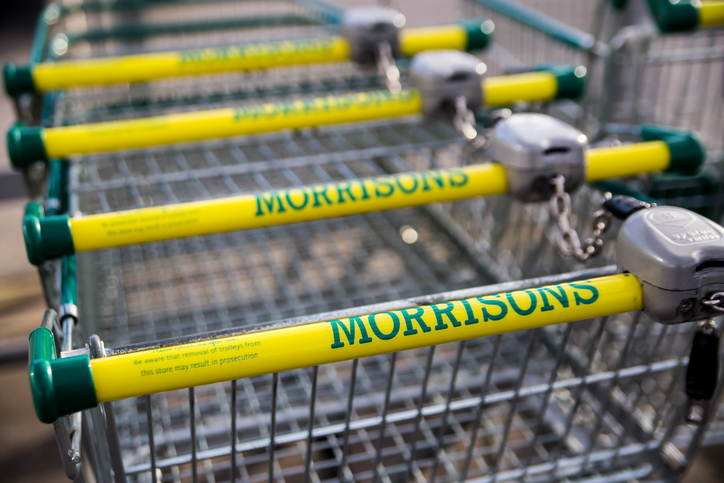Morrisons profit crash sours first-half results
The grocer will have to work hard in the second half of the year if it is to achieve full-year targets.
10th September 2020 08:37
by Richard Hunter from interactive investor
The grocer will have to work hard in the second half of the year if is to achieve full-year targets.

Contrary to popular belief, the pandemic was not an automatic home run for the supermarket sector, and the 25% drop in pre-tax half-year profits for Morrisons (LSE:MRW) is proof positive that additional sales come at an additional price.
The main culprits for the profit slump in the 26 weeks ended 2 August 2020 were significantly lower fuel income and extra operational costs arising from the pandemic.
Fuel sales all but evaporated for much of the period due to the lockdown, although there have been some improving signs of late, which should bode well for the second half. In terms of Covid-19 costs, these amounted to £155 million for the period, including the recruitment of 45,000 new or temporary staff, partially offset by business rates relief of £93 million. The overall deficit of £62 million is anticipated to be mirrored by a credit of the same amount in the remainder of the year, with Covid costs largely sunk but business rates relief still in place, which should leave a net neutral position.
With this in mind, and therefore propelled by an improvement to the net debt and cash flow positions, Morrisons has estimated that the year as a whole will still prove to be one of profit growth.
- Where to invest if a second wave of coronavirus strikes
- UK supermarkets, banks and travel: what’s the outlook after market sell-off?
The group’s decision to pay small suppliers immediately and invest in additional stock, alongside the lower fuel income, resulted in a net drain on cash for the period, with an outflow of £228 million comparing with an inflow of £244 million in the corresponding period. Net debt also increased by 14% to £2.8 billion with this strain on working capital, although there is little to fear around the company’s financial position. The cashflow position should strengthen in the short term, the store estate is largely freehold and there is access to £1.75 billion of liquidity if required, of which currently only £470 million has been drawn.
This strong financial backdrop has not extended to the company paying the special dividend as previously considered, but the fact that the ordinary dividend has been increased is certainly a sign of management confidence in the outlook. For generally starved income-seeking investors, the current yield of 3.5% sets Morrisons apart from many of its blue-chip peers in paying one at all in the current environment.
The pandemic may also have provided some positive unintended consequences for Morrisons. By necessity, it has streamlined some operations and had to ramp up its online offering, which was previously a laggard in terms of the sector as a whole. The fivefold increase in online and home delivery sales was made possible by brand new offerings such as doorstep delivery, initially aimed at the more vulnerable members of society, while the tie-ups with both Amazon (NASDAQ:AMZN) and Deliveroo proving successful.
Indeed, the Amazon partnership is to be extended further and this particular tie-up could have some very interesting implications in the medium term.
- UK stocks look cheap, but the real picture is complicated
- Take control of your retirement planning with our award-winning, low-cost Self-Invested Personal Pension (SIPP)
Overall, the reduction in profit for the period and an overall decline in revenues are understandable, but unfortunately both light of expectations. The trading picture excluding fuel looked rather more promising, but the second half of the year will need to be one of heavy lifting for the company to be able to achieve its full-year objectives.
As evidenced by the share price reaction today, down 4% in early deals, there may be some disappointment resulting from the numbers since the shares have had a good run ahead of this update, recovering by 19% since the March lows.
Indeed, over the last year the shares remain ahead by 4%, as compared to a decline of 17% for the wider FTSE 100 index. Even so, there has traditionally been a view that there is better value elsewhere in the sector, and these numbers are not enough to move the dial. The market consensus of the shares as a 'hold', albeit a strong one, is therefore unlikely to improve for the time being.
These articles are provided for information purposes only. Occasionally, an opinion about whether to buy or sell a specific investment may be provided by third parties. The content is not intended to be a personal recommendation to buy or sell any financial instrument or product, or to adopt any investment strategy as it is not provided based on an assessment of your investing knowledge and experience, your financial situation or your investment objectives. The value of your investments, and the income derived from them, may go down as well as up. You may not get back all the money that you invest. The investments referred to in this article may not be suitable for all investors, and if in doubt, an investor should seek advice from a qualified investment adviser.
Full performance can be found on the company or index summary page on the interactive investor website. Simply click on the company's or index name highlighted in the article.